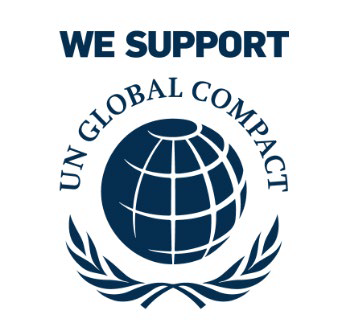Formulation of Human Rights Policy
Sumitomo Mitsui Construction Group has formulated the Charter of Corporate Behavior containing guidelines to be followed by the directors and employees of each group company, one of which is respect for human rights. "Respect for human rights" is recognized as a core value that applies to all business activities.
Accordingly, Sumitomo Mitsui Construction formulated the Human Rights Policy in November 2021 to clarify its commitment to human rights. The policy was formulated to align with international norms, including the Guiding Principles on Business and Human Rights published by the United Nations (hereinafter called "UNGP"). Unit It was deliberated by the Sustainability Promotion Committee and a resolution was passed at the Executive Management Meeting prior to approval by the Board of Directors. In February 2024, it was revised to the "Mitsui Sumitomo Construction Group Human Rights Policy" to apply to Group companies.
Respect for human rights
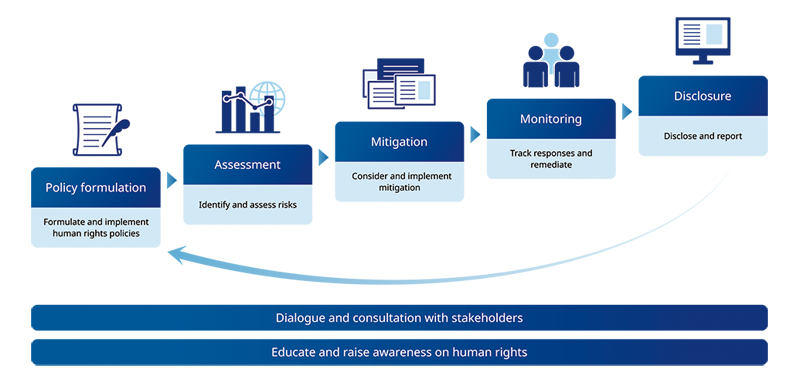
Corporate Structure for Human Rights
Chaired by the Representative Director and President, the role of the Sustainability Promotion Committee is to deliberate on important actions relating to sustainability at Sumitomo Mitsui Construction and its group companies. For important matters concerning sustainability, resolutions are passed at the Executive Management Meeting and approved by the Board of Directors.
In March 2021, we organized the SX Promotion Project, which is an interdepartmental organization, to promote specific company-wide sustainability initiatives on environment and society. Under the control of the SX Promotion Project, we established a Human Rights Working Group (WG) to examine and promote measures associated with respect human rights.
Structure for promoting Our Sustainability
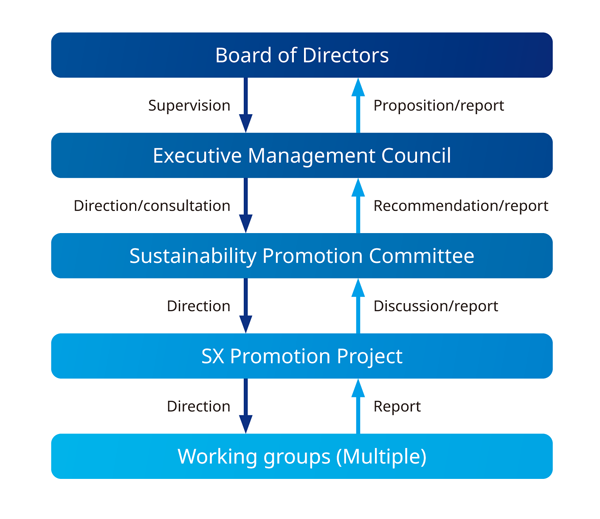
Human rights due diligence
Sumitomo Mitsui Construction has conducted human rights due diligence since February 2022, in accordance with the Human Rights Policy, to identify and assess any negative impacts on human rights in the business activities and implement measures for eliminating or reducing risk.
Based on a long list of human rights issues drawn up with reference to the Universal Declaration of Human Rights and other international norms, the Human Rights WG discussed the severity and likelihood of the each impact of human rights in our business activities. In order to assess the severity of the impact and the likelihood of its occurrence, we have started investigations in our domestic basis and Group companies in Japan.
The scope will be extended to suppliers to identify where human rights are at risk of infringement across the supply chain. A management system will also be established for taking actions on human rights such as analyzing the survey results, setting priorities on human rights issues according to importance, and considering adequate prevention, mitigation and remediation measures.
Important human rights issues
- Compliance with laws and regulations, bribery and corruption prevention
- Prohibition of discrimination, equality under the law
- Rigorous procurement practices (supplier management)
- Harassment and abuse
- Child labor (the right to education)
- Forced labor
- Occupational health and safety
- Working hours (the right to breaks and holidays)
- Rights of indigenous peoples and local residents
- Consumer interests (the right to safety and know, privacy management)
Human Rights Due Diligence Process
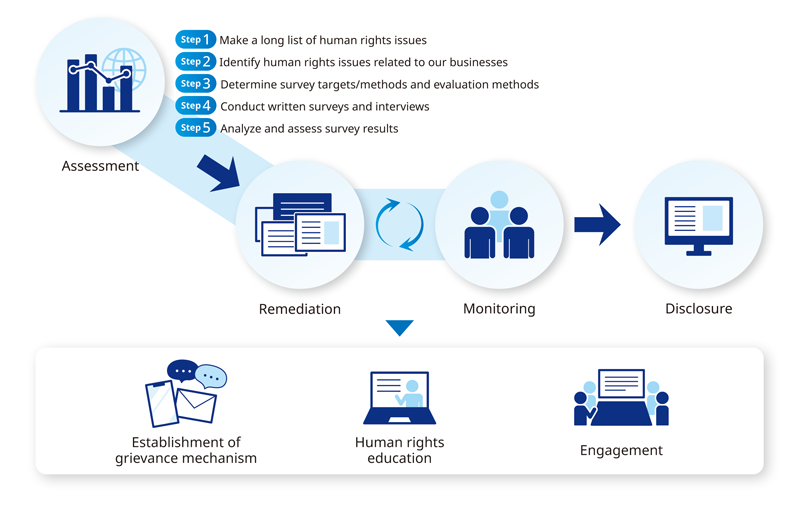
Risk assessment for human rights issues
When undertaking human rights due diligence, the UNGP requires the risk assessment of human rights issues to take into account the severity of impact and likelihood of occurrence of each risk. In the assessment, Sumitomo Mitsui Construction analyzes both severity (scope, magnitude and remediability) and likelihood (frequency, location and business characteristics etc.) while also taking account of our current management systems and prevention and mitigation measures.
Risk Assessment Method

Access to remedy
The UNGP requires companies to respect human rights and to have grievance mechanisms in place to enable redress for human right abuses. In parallel with our efforts to respect human rights, we will work to develop and expand effective grievance mechanisms and strive to create a better society.
If you have any questions, complaints, or other problems related to human rights, please contact us at this inquiry. We welcome comments from all stakeholders, including our group executives and employees, customers, supply chain workers, and local communities.
We will take appropriate and necessary measures to protect the anonymity and protection of our customers. In addition, if it becomes clear that our group's business activities have caused or contributed to the negative impact on human rights, we will work to correct or remedy them through internal and external procedures.
* We also accept by mail, telephone, facsimile, etc.
Education on Human Rights
Sumitomo Mitsui Construction provides education on human rights to deepen employees' understanding of respect for human rights.
In FY2021, the e-learning education was conducted to all directors and employees on the theme of "Business and Human Rights," and it was translated into English, and provided it as a educational materials for local staff working overseas.
We also provide education on human rights for new employees, and as well as on compliance and harassment for all employees regularly. We will expand these education to our group companies and through continuous education and awareness-raising, we will promote our Human Rights Policy and respect for human rights in our group.
Human Rights Education Materials (English)
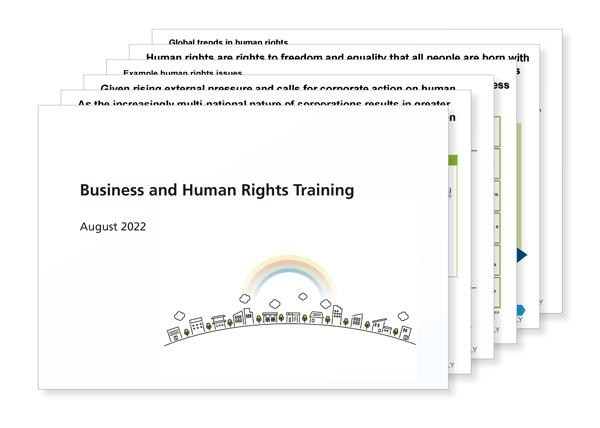
Signed the United Nations Global Compact
We signed a petition expressing our support for the United Nations Global Compact and was registered as a participant on August 16, 2022. We also joined the Global Compact Network Japan, its local network in Japan.
We support the 10 principles of the UN Global Compact in 4 areas (human rights, labor, environment, and anti-corruption) and will contribute to the realization of a sustainable society through our global business activities.
The Ten Principles of the UN Global Compact
Human Rights
| Principle 1: | Businesses should support and respect the protection of internationally proclaimed human rights; and | |
| Principle 2: | make sure that they are not complicit in human rights abuses. |
Labour
| Principle 3: | Businesses should uphold the freedom of association and the effective recognition of the right to collective bargaining; | |
| Principle 4: | the elimination of all forms of forced and compulsory labour; | |
| Principle 5: | the effective abolition of child labour; and | |
| Principle 6: | the elimination of discrimination in respect of employment and occupation. |
Environment
| Principle 7: | Businesses should support a precautionary approach to environmental challenges; | |
| Principle 8: | undertake initiatives to promote greater environmental responsibility; and | |
| Principle 9: | encourage the development and diffusion of environmentally friendly technologies. |
Anti-Corruption
| Principle 10: | Businesses should work against corruption in all its forms, including extortion and bribery. |

